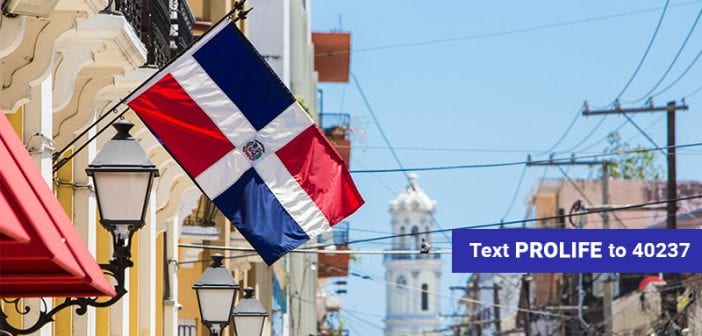Abortion activists in the Dominican Republic are demanding the legalization of abortion. In the strongly Pro-Life country, abortion is currently illegal in all circumstances. Last month, radical activists started protesting daily outside the executive mansion of President Luis Abinader, refusing to leave until their demands are met.
As in other strongly Pro-Life countries, there is intense pressure from international organizations, like the United Nations and Amnesty International, to capitulate to the anti-Life demands. Pro-Life lawmakers in the Dominican Republic also face mounting pressure from other outside groups like those staging solidarity protests in New York City, a place in which abortion is legal for virtually any reason up to birth.
According to NBC, the anti-Life protesters were emboldened in part by Abinader’s pledge on the campaign trail to decriminalize the killing of the preborn in cases in which the mother’s life is at risk, in instances of life-limiting disability, and in cases of rape and incest. Contrary to what abortion activists claim, abortion is never necessary to save the life of the mother. In a life-threatening emergency, the baby can be delivered prematurely instead of deliberately and violently ending the life of an innocent child before removing him or her from the womb.
Additionally, we have seen in nation after nation that legal abortion begins with demands for the “hard cases,” when the mother has serious health complications or the child was conceived in rape. However, abortion is not the answer in these difficult circumstances. Abortion activists are also not primarily concerned with these difficult scenarios; the “hard cases” are a ploy to legalize the killing of the preborn. Once abortion is legal, abortion activists can push to expand the killing.
In the Dominican Republic, abortion activists are using the high maternal mortality rate as a reason that abortion is necessary. The reality is that legal abortion does not improve the maternal mortality rate. Ireland, which was one of the strongest Pro-Life nations in the world before elective abortion was legalized in 2018, also had one of the best records on care for mothers during pregnancy.
Nonetheless, abortion activists have latched onto the false message that abortion will “save lives,” demanding “the right to life of pregnant people” and “their right to dignity.” Pregnancy does not remove the Right to Life of the mother, but abortion certainly obliterates the preborn child’s Right to Life. Saying that abortion saves lives is nonsensical because the purpose of abortion is to end an innocent human Life growing in the womb.
In further illogic, one abortion activist told NBC, “To decriminalize abortion is to end injustices.” There is no greater injustice than violently ending an innocent human Life. To pretend that sanctioning the killing of the preborn is to end injustice is to ignore the reality of abortion.
Again, fundamentally mischaracterizing abortion, another abortion activist said, “What bothers me is seeing how everybody wants to legislate our bodies, women’s bodies. It’s like the first thing in their agenda is to control women. That’s not right. We need to change that — who tells a man when to get a vasectomy? Nobody.” In these absurd soundbites from the abortion lobby, the activists’ blindness is obvious. Refusing to acknowledge the child in the womb, the activists fixate on how Pro-Lifers are supposedly trying to control women. Pro-Lifers are not telling anyone what to do but merely defending the right of the preborn child to live.
The ongoing protests in the Dominican Republic resemble those that occurred in Quintana Roo in Mexico. Radical abortion activists are resorting to occupying the legislature and demanding that lawmakers comply with their anti-Life agenda. For nations like the Dominican Republic, facing international pressure from without and pressure from radical abortion activists from within, standing for Life can be difficult.
There is hope. In Argentina and Poland, abortion activists, aided by international groups, made similar demands and grassroots Pro-Life activists heroically resisted. In Argentina, Pro-Lifers won a decisive victory defending the preborn in 2018. Sadly, earlier this year, abortion became legal in some circumstances. Poland continues to be strongly Pro-Life, defending the Right to Life of babies who may have a disability or life-limiting condition. Pro-Life advocates in the Dominican Republic are facing immense pressure, but they may yet defend the preborn in their country.

